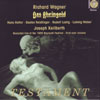Wagner Rheingold
The Prelude to the Keilberth Ring maintains this cycle's superb standard
View record and artist detailsRecord and Artist Details
Composer or Director: Richard Wagner
Genre:
Opera
Label: Testament
Magazine Review Date: 1/2007
Media Format: CD or Download
Media Runtime: 142
Mastering:
Stereo
ADD
Catalogue Number: SBT21390

Tracks:
| Composition | Artist Credit |
|---|---|
| (Der) Ring des Nibelungen: Part 1, '(Das) Rheingold' |
Richard Wagner, Composer
Bayreuth Festival Orchestra Elisabeth Schärtel, Wellgunde, Soprano Georgine von Milinkovic, Fricka, Mezzo soprano Gustav Neidlinger, Alberich, Bass Hans Hotter, Wotan, Alto Hertha Wilfert, Freia, Soprano Josef Greindl, Fafner, Bass Josef Traxel, Froh, Tenor Joseph Keilberth, Conductor Jutta Vulpius, Woglinde, Soprano Ludwig Weber, Fasolt, Baritone Maria Graf, Flosshilde, Mezzo soprano Maria von Ilosvay, Erda, Contralto (Female alto) Paul Kuen, Mime, Tenor Richard Wagner, Composer Rudolf Lustig, Loge, Tenor Toni Blankenheim, Donner, Baritone |
Author: Alan Blyth
Here we are at the start of the revelatory Bayreuth Ring of 1955, and from the very first primordial sounds Joseph Keilberth establishes that this is to be a very special cycle. The opening scene is dominated by Gustav Neidlinger's nonpareil of an Alberich, who in the third scene becomes a frightening incarnation of malevolent power. But the Rhinemaidens aren't as steady as one might wish.
Scene 2 brings a kaleidoscope of authoritative interpretations, headed by Hans Hotter's commanding Wotan, a thoughtful portrait of an overweening, troubled figure sung with a Lieder-like attention to verbal detail. Georgine von Milinkovic is a suitably imposing Fricka and a convincing nag. Ludwig Weber's expressive, articulate Fasolt is partnered by Josef Greindl's louring Fafner. Rudolf Lustig's strongly sung Loge - no comprimario tenor he - is not the most fluent piece of singing, but he gives the text real meaning.
Among the minor gods Josef Traxel stands out for his beautifully lyric Froh, luxury casting from one of the leading tenors then active in Germany. Maria von Ilosvay as Erda and Paul Kuen as Mime are just as characterful as in in Siegfried. Over all you have once again a sense of a truly experienced ensemble, each member of which plays to the other.
As with the two previous works so far issued (the Gramophone Award-winning Siegfried, 3/06, and Die Walküre, 9/06)), one is astounded by the ideal capturing of the Bayreuth acoustics and by the superlative playing of the orchestra, stimulated by Keilberth's astutely dramatic conducting. Now on to Götterdämmerung and the completion of an exciting project.
Scene 2 brings a kaleidoscope of authoritative interpretations, headed by Hans Hotter's commanding Wotan, a thoughtful portrait of an overweening, troubled figure sung with a Lieder-like attention to verbal detail. Georgine von Milinkovic is a suitably imposing Fricka and a convincing nag. Ludwig Weber's expressive, articulate Fasolt is partnered by Josef Greindl's louring Fafner. Rudolf Lustig's strongly sung Loge - no comprimario tenor he - is not the most fluent piece of singing, but he gives the text real meaning.
Among the minor gods Josef Traxel stands out for his beautifully lyric Froh, luxury casting from one of the leading tenors then active in Germany. Maria von Ilosvay as Erda and Paul Kuen as Mime are just as characterful as in in Siegfried. Over all you have once again a sense of a truly experienced ensemble, each member of which plays to the other.
As with the two previous works so far issued (the Gramophone Award-winning Siegfried, 3/06, and Die Walküre, 9/06)), one is astounded by the ideal capturing of the Bayreuth acoustics and by the superlative playing of the orchestra, stimulated by Keilberth's astutely dramatic conducting. Now on to Götterdämmerung and the completion of an exciting project.
Discover the world's largest classical music catalogue with Presto Music.

Gramophone Digital Club
- Digital Edition
- Digital Archive
- Reviews Database
- Full website access
From £8.75 / month
Subscribe
Gramophone Full Club
- Print Edition
- Digital Edition
- Digital Archive
- Reviews Database
- Full website access
From £11.00 / month
Subscribe
If you are a library, university or other organisation that would be interested in an institutional subscription to Gramophone please click here for further information.




